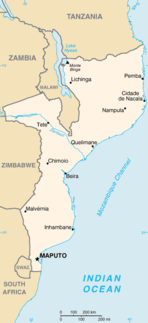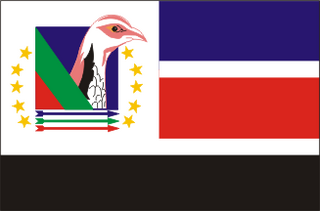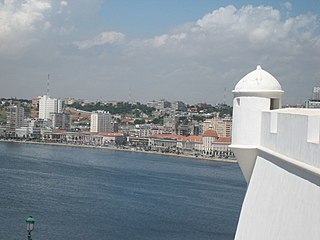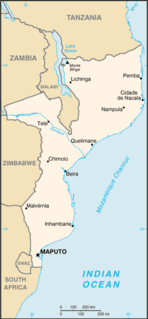| UN Security Council Resolution 818 | |
|---|---|
| Date | 14 April 1993 |
| Meeting no. | 3,198 |
| Code | S/RES/818 (Document) |
| Subject | Mozambique |
Voting summary | 15 voted for None voted against None abstained |
| Result | Adopted |
| Security Council composition | |
Permanent members | |
Non-permanent members | |
United Nations Security Council resolution 818, adopted unanimously on 14 April 1993, after reaffirming resolutions 782 (1992) and 797 (1992) on the situation in Mozambique, the Council stressed its concern regarding the delays and difficulties affecting the implementation of the peace process envisaged in the Rome General Peace Accords during the Mozambican Civil War.

United Nations Security Council resolution 782, adopted unanimously on 13 October 1992, after welcoming the Rome General Peace Accords signed on 4 October 1992, in Rome between the FRELIMO (government) and RENAMO (rebel) parties in the Mozambican Civil War, the Council approved the appointment of an interim Special Representative and the deployment of up to 25 military observers to Mozambique. The Special Representative was an Italian, Aldo Ajello.

United Nations Security Council resolution 797, adopted unanimously on 16 December 1992, after reaffirming Resolution 782 (1992), the Council decided to establish the United Nations Operation in Mozambique (ONUMOZ) as proposed by the Secretary-General Boutros Boutros-Ghali in line with the peace agreement for Mozambique.

Mozambique, officially the Republic of Mozambique, is a country located in Southeast Africa bordered by the Indian Ocean to the east, Tanzania to the north, Malawi and Zambia to the northwest, Zimbabwe to the west, and Eswatini (Swaziland) and South Africa to the southwest. The sovereign state is separated from the Comoros, Mayotte and Madagascar by the Mozambique Channel to the east. The capital of Mozambique is Maputo while Matola is the largest city, being a suburb of Maputo.
Contents
The resolution called upon the Government of Mozambique and RENAMO to co-operate with the Secretary-General Boutros Boutros-Ghali and the Special Representative during the implementation of the mandate of the United Nations Operation in Mozambique (ONUMOZ), and further urged both to comply with the commitments they entered into with the Peace Accords, particularly in relation to the concentration, assembly and demobilisation of their armed troops and the formation of a new armed forces. In this respect, it called for the training of the new Mozambican Defence Force as soon as possible. [1]

Politics of Mozambique takes place in a framework of a semi-presidential representative democratic republic, whereby the President of Mozambique is head of state and head of government of a multi-party system. Executive power is exercised by the government. Legislative power is vested in both the government and the Assembly of the Republic. The Economist Intelligence Unit has rated Mozambique as "hybrid regime" in 2016.

The Mozambican National Resistance is a militant organization and political movement in Mozambique. Sponsored by the Rhodesian Central Intelligence Organisation (CIO), it was founded in 1975 as part of an anti-communist backlash against the country's ruling FRELIMO party.

Boutros Boutros-Ghali was an Egyptian politician and diplomat who was the sixth Secretary-General of the United Nations (UN) from January 1992 to December 1996. An academic and former Vice Foreign Minister of Egypt, Boutros-Ghali oversaw the UN at a time when it dealt with several world crises, including the breakup of Yugoslavia and the Rwandan genocide. He was then the first Secretary-General of the Organisation internationale de la Francophonie from 16 November 1997 to 31 December 2002.
Further addressing the two parties, the resolution welcomed the announcement of both to convene as soon as possible a meeting between the President of Mozambique and the President of RENAMO and at the same time appealed to RENAMO to ensure uninterrupted functioning of the joint Commissions and monitoring mechanisms and for both parties to respect the ceasefire and allow freedom of movement and goods. It also called for the freedom of movement of ONUMOZ, welcomed the Secretary-General's intention to deploy the peacekeeping force and stressed the importance of the early signature of the status of forces agreement between the Government of Mozambique and the United Nations to facilitate free, efficient and effective operation of ONUMOZ in the country. The agreement was signed on 14 May 1993. [2]
Freedom of movement, mobility rights, or the right to travel is a human rights concept encompassing the right of individuals to travel from place to place within the territory of a country, and to leave the country and return to it. The right includes not only visiting places, but changing the place where the individual resides or works.

Peacekeeping refers to activities intended to create conditions that favour lasting peace. Research generally finds that peacekeeping reduces civilian and battlefield deaths and reduces the risk of renewed warfare.
The Council concluded by welcoming the efforts of Member States in Mozambique and requested the Secretary-General to submit, by 30 June 1993, a report on the situation in the country, including preparations for the elections and the demobilisation of Mozambican forces.















